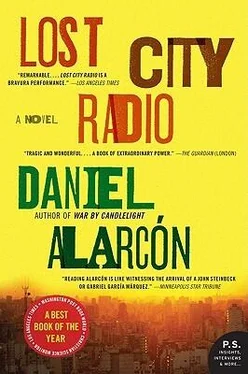The man shook his head. His face was dotted with whitish stubble. “Are you?”
“I’m just a reporter.”
“So report. Why don’t you start with this: there’s a man inside. He’s tied to a wooden chair.”
The fireman blew smoke from his nose in dragon bursts.
And for the duration of the war, more than the firefights in the Old Plaza, more than the barricaded streets of The Cantonment or even the apocalyptic Battle of Tamoé—this is what Norma remembered: this man inside, this stranger, tied to a chair. For the rest of that long night and into the early morning, as the news came from a dozen remote points in the city, news of an offensive, news of an attack, as the first of the Great Blackouts spread across the capital — Norma took it all in with the drugged indifference of a sleepwalker. Cruelty was something she couldn’t process that day. On another day, perhaps, she might have done better. She looked the fireman in the eye, hoping to find a hint of untruth, but there was none. The people watched the flames dispassionately. The fire crackled, the house fell in on itself, and Norma listened for him. Surely, he was dead already. Surely his lungs were full of smoke and his heart still. For Norma, there was only a light-headed feeling, like being hollowed out. She felt incapable of writing anything down, of asking a single question. At the edge of the crowd, a girl of thirteen or fourteen sucked on a lollipop. Her mother rang the tiny bell on her juice cart, and it clinked brightly.
WHEN REY returned from the Moon to live on his father’s couch, it was Trini who made certain he didn’t give up. It was Trini who told him stories and reminded him of better, happier times. On the evenings Rey’s father taught at the institute, Trini would come to look for his nephew, and convince him with persistent good cheer to leave the cluttered apartment, to see what the city had to offer. “The streets are full of beautiful women!” he would say. So they took long evening walks through the district of Idorú, toward Regent Park and through The Aqueduct, often making it as far as the Old Plaza — known simply as the Plaza in those days. Once there, they gave themselves over to the noise of the street musicians and the comedians, to the crowds of people seated around the dry fountain, all smoke and talk and laughter, and Rey, because he loved his uncle, made every attempt to be happy, or more precisely, to appear so.
It’s true that his days were oppressively lonely, that he slept poorly, that the same nightmares kept coming back. Rey spent his time pacing his father’s apartment, rearranging scattered papers or reading his old man’s dictionaries. During the morning hours, he prepared mentally for his midday excursion out to the corner for a bite to eat. It was pure torment. He was afraid that no one would speak to him, and equally terrified that they might. He postponed lunch as long as he could, until three or even four in the afternoon. Once it was taken care of, Rey could sleep, sometimes for as long as an hour.
But on these night strolls beneath the city’s yellow streetlights, everything was softer, simpler. The shoeshine boys and pickpockets gathered at one end of the Plaza, counting their day’s take. Along the alley on the north side of the cathedral, a half-dozen women set up their stalls, selling fresh bread and old magazines, bottle caps and matchbooks from the city’s finer hotels. A crew of jugglers might be preparing for a show, and everywhere, the industrious city seemed poised to relax.
One night in June, Trini and Rey arrived in the Plaza in time to see the flag being lowered. It took fifteen soldiers to fold it. A cornet played a martial melody, and some tourists took photos. Rey kept his hands in his pockets. He felt nothing. In a week, he would start his work in Tamoé, become a representative of that flag. He and his uncle had been talking about it, how strange it was to be tortured by the state and then employed by it, all in a matter of months. The government, after all, was a blind machine: now its soldiers stood at attention, and the flag was folded and passed from one to the next, down the line, until all that remained was a meter square of blood-red fabric and a set of hands at each corner. The cornet blew a last, wailing note. Rey was going to say something, when he turned and noticed that Trini had stopped, was standing still with his back straight and his hands together. Then Trini saluted. He caught Rey looking and smiled sheepishly.
Trini had started a new job a few months before Rey was taken to the Moon, as a prison guard in a district known as Venice because it flooded almost every year. In fact, it was by petitioning Trini’s supervisor that Rey had been released. The prison in Venice was dangerous and sprawling, with multiple pavilions for the nation’s various undesirables. Six days a week, he was in charge of terror suspects. The war hadn’t officially begun yet, and there weren’t many of these men, but their numbers were growing, and their demeanor was unlike that of any prisoners Trini had previously encountered. They were not cowed by any show of force, and their swagger was not a put-on: it came from a very honest and confident place. Some had the look of students, others came from the mountains. They felt they owned the prison, and of course, they were right. If it was trouble Trini had wanted, here it was: violent and unremitting. It could boil over at any time.
Rey and Trini walked through the Plaza, past costumed men selling jungle medicine, past hunched-over typists at work on love letters or government forms, to a side street where Trini knew a woman who sold excellent pork kebabs. “Special recipe,” he said, “my treat.” Sure enough, there were a dozen people waiting. They got in line. Down the street, a city work crew painted over a graffitied wall. “A guard was killed today,” Trini said to Rey. “An execution. The IL.”
“Did you know him?”
Trini nodded. “We’re in for trouble. Lots of it. Those little boy soldiers folding the flag — they have no idea.”
The line inched forward. The smoke made Rey’s eyes water. He inhaled the scent of charcoal and burning meat. One night at the Moon, he had smelled something like this. It had gutted him: the realization that these soldiers were going to burn him alive, that they were going to eat him. He’d decided very early on that these torturers were capable of anything, and he’d never expected to leave that place alive — why not let himself be eaten?
Of course, they were only celebrating a birthday.
“Are you all right?” Trini said.
Rey nodded. A moment passed. Trini hummed the melancholy tune of an old song.
“How come no one’s ever asked me what happened?”
“What?”
Rey looked up and down the line. He felt something sudden and hot within him. “At the Moon,” he said, and a few heads turned. “What they did to me. How come no one’s ever asked. Don’t you want to know?”
Trini gave his nephew a blank stare. He blinked a few times, and the edges of his mouth curled downwards. “I work in a prison.” He coughed and waved away the smoke. “I know exactly what they did to you.”
A few people fell out of line. Rey stood there, silent and seething. His jaw hurt. He remembered everything, every detail of every moment. At night, he had been surrounded by other broken men whom he could not see. They sobbed alone, and no one comforted anyone else. They were afraid.
“They were going to eat me.”
Trini raised an eyebrow. “Keep your voice down.”
“Go to hell.”
“I do, boy. Six days a week.”
Half the line had cleared out by now, abandoned their places. Too much talking, too much indiscretion. A breeze blew, momentarily clearing the smoke from the street. A man in a knit cap sat on the curb, rolling a cigarette. Rey stepped out of line. Trini followed and caught him at the corner. They walked together — or rather, not together at all, but in the same direction. Finally, at a busy intersection, Rey and Trini waited side by side to cross.
Читать дальше












